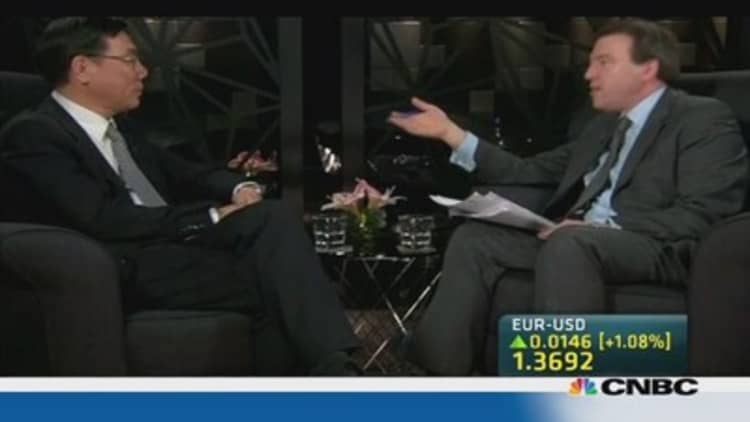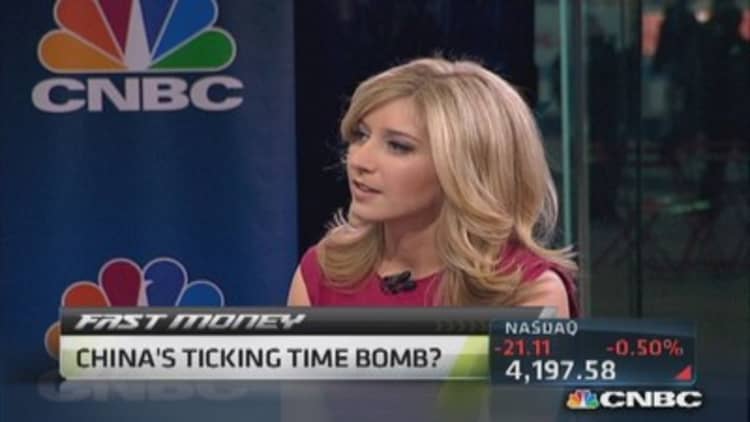China's shadow banking troubles may be causing more hand-wringing than usual in the wake of a likely fund product default, but the problem may not be nearly as systemic as analysts believe.
"I don't think it's as systemic and alarming as sometimes it's made out," said Bill Maldonado, chief investment officer for Asia at HSBC. "It's an area of concern," he told CNBC, but he added that the risks are exaggerated.
(Read more: China must accept global banking standards: Ex-UK PM)
"It gets called shadow banking and that has negative connotations," he noted. "It sounds like it's an operation that's under the radar, that's not overseen by regulators. And that's just not true. The trust banks are overseen. The banks that sell the products are overseen. It's a regulated activity."

The most recent concerns were sparked by news one of the country's high-yield trust investments appears set for what could be the first default on a principal repayment.
While China's homegrown stock market investors have felt the sting of losses, the trust products, which generally have high minimum investments and target richer investors, are widely perceived as coming with a guarantee from state-run banks.
The 3 billion yuan, or around $496 million, trust, which has the unwieldy moniker "2010 China Credit / Credit Equals Gold #1 Collective Trust Product," used its funds to make a loan to unlisted coal company Shanxi Zhenfu Energy Group, which has since collapsed. ICBC, which helped to market the product, has said it won't step in to repay investors.
(Read more: China's shadow banking reform faces its first test)
There is an assumption that all of these trust products are vulnerable to default, but most will not, Maldonado said. "Those that are are going to have some recovery value. It's not like these things will be worth zero," he said. "Any impairment could be dealt with by the economy."
While the amounts involved sound large, they only account for about 10 percent of the overall banking system, he noted.
Maldonado believes that in the longer run, "it's a very good signal to send to investors that these are not guaranteed products that the banks are standing behind. That there is risk when they're investing in these kinds of products."
(Read more: Are China bank stocks cheap or just crummy?)
It is a view echoed by Jiang Jianqing, chairman of ICBC, the world's largest bank by assets. If customers buy wealth management products or other products they must see clearly the risks, Jiang told CNBC.

Jiang also downplayed another, related banking system concern: the non-performing loans, or NPLs, saying they remained under control.
To be sure, many analysts are skeptical of the prospects for China's banks amid concerns not just that bad loans may rise as economic growth slows, but also on how big the bad debt problem might be. China's banking regulators said bad bank loans stood at 563 billion yuan at the end of September, representing around 0.97 percent of loans system-wide.
Jiang noted that NPL ratios in large European and U.S. banks are generally 2 percent or higher.
"We understand there are risks in our loans," Jiang said, but added the risks are manageable. He noted that his bank's pretax profit for the past year was $50 billion, with less than $2 billion used to write off bad loans.
(Read more: China's bad-loan skeletons to haunt markets)
"Risk at Chinese banks is very low," Jiang said.
Maldonado also believes the risk is manageable.
With most of the recipients of bad loans concentrated in the unlisted state-owned enterprises and local government financing vehicles, the resolution will need to be worked out between the banks, the central and local governments and the companies, Maldonado said.
Not only are the banks very profitable, "the assumption of bigger numbers (for NPLs) that you see bandied around is that the assets that are not performing are complete write offs, that they're worthless and that's way too negative, way too bearish," Maldonado said. "It is very unlikely to be the worst case scenario."
—By CNBC.Com's Leslie Shaffer; Follow her on Twitter @LeslieShaffer1

